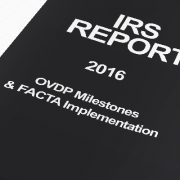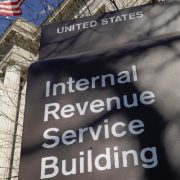Getting Ready For The 2017 Tax Filing Season
IRS Giving Taxpayers To April 18, 2017 To File 2016 Individual Income Tax Returns.
The Internal Revenue Service announced that it can start accepting 2016 income tax returns onMonday, January 23, 2017. Returns filed before that date (by paper or electronically) will be held in suspense by the IRS. Since the IRS will begin processing tax returns on January 23rd there is no advantage to filing tax returns on paper in early January instead of waiting for the IRS to begin accepting e-filed returns. Nevertheless, it makes sense to start organizing your information early and so when the IRS filing systems open on January 23rd, you are ready to submit your tax return right away.
The IRS expects that more than 153 million individual tax returns will be filed in 2017 and that at least 80% of the tax returns will be prepared electronically using tax return preparation software.
April 18thFiling Deadline
The filing deadline to submit 2016 tax returns is Tuesday, April 18, 2017, rather than the traditional April 15thdate. The reason why is that in 2017, April 15 falls on a Saturday, and this would usually move the filing deadline to the following Monday – April 17. However, Emancipation Day – a legal holiday in the District of Columbia – will be observed on that Monday, which pushes the nation’s filing deadline to Tuesday, April 18, 2017. Under the tax law, legal holidays in the District of Columbia affect the filing deadline across the nation. Be careful though with regards to the filing deadlines for 2016 State Individual Income Tax Returns as not all States may follow Federal law when it comes to the filing deadline and for those who do not, the filing deadline would be Monday, April 17, 2017.
Refunds in 2017
Choosing e-file and direct deposit for refunds remains the fastest way to file an accurate income tax return and receive a refund.The IRS still anticipates issuing at least 90%of tax refunds in less than 21 days, but there are some important factors to keep in mind for taxpayers that could cause delay.Under the Protecting Americans from Tax Hikes (PATH) Actwhich takes into effect this 2017 Tax Filing Season, the IRS is required to hold refunds for tax returns which include a claim of the Earned Income Tax Credit (EITC) and the Additional Child Tax Credit (ACTC) until February 15, 2017. Also consider that it would still take several days for these refunds to be released and processed through financial institutions, and factoring in weekends and the President’s Day holiday, taxpayers claiming these credits may not have actual access to their refunds until the week of Feb. 27th.
The status of your tax refund can be checked directly with IRS by using the Where’s My Refund? on IRS.gov and the IRS2Go phone app.
Renewal Reminder for Individual Taxpayer Identification Numbers (ITINS) ITINs are used by people who have tax-filing or payment obligations under U.S. law but are not eligible for a Social Security number. Under a recent change in law, any ITIN not used on a tax return at least once in the past three years will expire on January 1, 2017. In addition, any ITIN with middle digits of either 78 or 79 (9NN-78-NNNN or 9NN-79-NNNN) will also expire on that date.
This means that anyone with an expiring ITIN and a need to file a tax return in the upcoming filing season should file a renewal application in the next few weeks to avoid lengthy refund and processing delays. Failure to renew early could result in refund delays and denial of some tax benefits until the ITIN is renewed.
An ITIN renewal application filed now will be processed before one submitted at the height of tax season from mid-January to February. Currently, a complete and accurate renewal application can be processed in as little as seven weeks. But this timeframe is expected to expand to as much as 11 weeks during tax season, which runs from mid-January through April.
Time Limits For Keeping Your Tax Records
Even though your 2016 income tax return is processed by the IRS and a refund is issued, that does not mean the IRS can later question or audit the tax return, In fact the Statute Of Limitations allows the IRS three years to go back and audit your tax return. That is why it’s a good idea to keep copies of your prior-year tax returns and supporting backup documentation for at least three years. And if you do get selected for audit, it would be best for you to exercise your right to hire tax counsel to represent you in the audit to minimize your contact with the IRS and to assure that you are entitled to claim all benefits that you are eligible under the tax law for your situation.











 Follow
Follow Follow
Follow